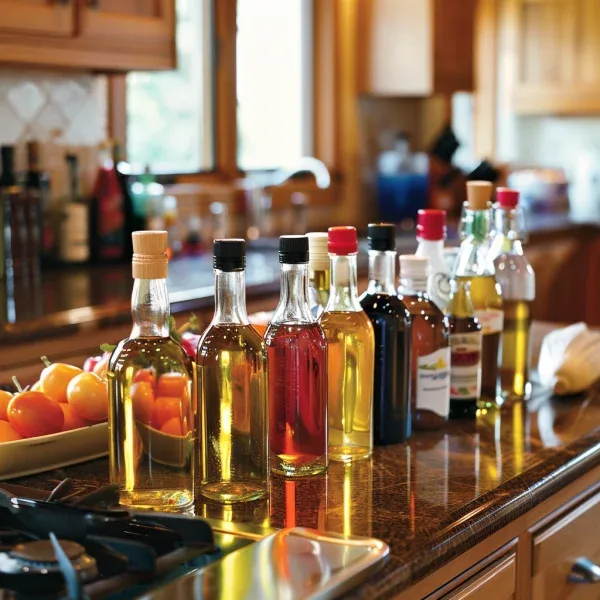by Eliza Sterling

With countless oils to choose from for cooking, it’s easy to get in a tizzy. Luckily, our resident nutritionist and culinary expert, Bailey Rose, sheds light on the healthiest oils to cook with in your kitchen.
Why Does the Smoke Point Matter?
Striving for a nutritious and balanced diet doesn’t stop at choosing the right ingredients. How we prepare our food, specifically, the oil we use for cooking, also plays a vital role.
The smoke point of oils, defined as the temperature at which the oil burns and starts to decompose, is crucial. Cooking oils beyond their smoke points trigger chemical alterations, producing harmful free radicals linked to heart disease and fostering inflammatory responses in the body.
Factors affecting the smoke point of an oil include its processing, the quality of the ingredients, and its nature – whether it’s saturated, monounsaturated, or polyunsaturated.
Quality is a Quintessential Factor
The superiority of oils can significantly impact their nutritive value – the less refined, the more nutrients they preserve. Refined oils, such as corn, soy, and sunflower oils, lose some health benefits found in unrefined, cold-pressed versions, rich in valuable antioxidants and plant sterols.
Balancing Your Fats
Fat, when appropriately balanced, is crucial in maintaining good health. It’s recommended that about a third of our daily calories should come from fats, with a maximum of 11% from saturated fats. However, a glaring issue with our modern diet is the overconsumption of omega-6 fats found in common vegetable oils, leading to a spike in inflammation given its imbalanced ratio with heart-healthy omega-3 fats.
Adhering to an ideal ratio of 4:1 or 6:1 for omega-6 to omega-3 fats can help restore this balance. Adjusting your cooking oil choices is an accessible first step to achieve this, where the current intake ratio is a worrisome 10:1.
Recommended Fats for Cooking
To ensure your oils retain their flavor and nutritional content, storage is key. Keep them in dark glass containers, away from heat.
- Extra Virgin Olive oil: Renowned for its health benefits, monounsaturated fats, antioxidant vitamin E and plant polyphenols, it’s perfect for sautéing and roasting.
- Coconut oil: Rich in saturated fats, this heat-stable oil is ideal for baking and medium-high heat sautéing. It also contains energy-boosting fatty acids.
- Cold-Pressed Extra Virgin Avocado Oil: High in monounsaturated fats and antioxidants, this oil of subtle, buttery flavor also boasts a high smoke point.
- Organic Butter & Ghee: Containing beneficial fatty acids and vitamins, these are suitable for high-temperature cooking.
- Extra Virgin Cold-Pressed Rapeseed Oil: This neutral-tasting oil has a high smoke point and is low in saturated fat, making it an excellent source of monounsaturated fats.
Picking cooking oils can be a confusing task – but with this guide, we hope you’ll make more informed choices aligned with your health and dietary goals.
cooking oils, healthiest oils, oil smoke point, refined oils, monounsaturated fats, omega-6 fats, omega-3 fats, Extra Virgin Olive oil, Coconut oil, cold-pressed extra virgin avocado oil, organic butter and ghee, extra-virgin cold-pressed rapeseed oil, culinary oils, fatty acids, antioxidant, vitamin E.
Leave a Reply